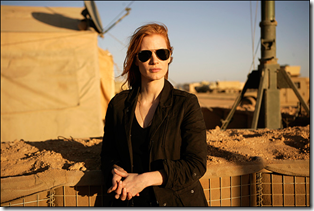I saw Zero Dark Thirty last night, so I can can finally discuss the various controversies.
But first, let me say that I liked the movie very much, although not as much as many others. The direction, photography, acting, and editing were all topnotch. But there was something hollow in the center. We never learn anything about the lead character, Maya (Jessica Chastain), beyond her obsession with Osama Bin Laden. None of the other characters seem to have lives, either. I’m giving this film a B+.
Let’s start with the simple controversy: Some have complained that the film plays fast and loose with the facts, and therefore fails as honest journalism.
Zero Dark Thirty is a narrative–a movie with actors following a script (in this case written by Mark Boal). It is not a documentary. Accusing a narrative of historical inaccuracy is like accusing a boat of not flying.
Yes, it opens with a claim that it’s based on first-hand accounts of actual events. So what? Fargo opens with a statement that the story is entirely true, and that’s a bald-faced lie.
Both Boal and director Kathryn Bigelow have  admitted that Maya is basically a fictitious character. Yes, she’s based on an actual person, but the model for Maya was a man. In journalism, changing a person’s gender is inexcusable. For this particular work of fiction, it was absolutely the right thing to do. Her gender added additional conflict between her and her mostly sexist co-workers, and made the character more interesting. (And believe me, this movie needed anything it could use to make the protagonist interesting.)
admitted that Maya is basically a fictitious character. Yes, she’s based on an actual person, but the model for Maya was a man. In journalism, changing a person’s gender is inexcusable. For this particular work of fiction, it was absolutely the right thing to do. Her gender added additional conflict between her and her mostly sexist co-workers, and made the character more interesting. (And believe me, this movie needed anything it could use to make the protagonist interesting.)
Now, onto the bigger, more complicated controversy: torture.
The film opens with an extended sequence where a white CIA operative tortures a bound, helpless, frightened Arab. He yells at his prisoner, humiliates him, beats him, suspends him, and crudely waterboards him. The scene is sickening. Watching it, my sympathy went directly to the victim, with the CIA agent clearly the bad guy. I truly hope that everyone who sees this movie has the same emotional reaction.
Yet I’m not sure that was the response that Boal and Bigelow wanted. That torturer becomes a semi-major character in the story, and while I didn’t exactly warm up to him (you can’t really warm up to anyone in Zero Dark Thirty), he was clearly one of the good guys. He eventually quits that job because he’s "seen too many naked men."
The film never directly claims that torture yields reliable results, and is therefore justifiable. But it kind of implies that. The torturer eventually gets useful info out of his victim with a well-placed lie and some kindness, but the torture may have softened him up, first. When candidate Barak Obama announces that he will cease torture, and later as President follows through on that promise, no one in the movie sees this as a good thing. They react as if an important weapon has been removed from their arsenal.
Obviously, I would have preferred a film where torture provided only bad information, the torturers were clearly villains, and Obama rekindled a dormant search for Bin Laden. But should art validate my beliefs, or challenge them?
Zero Dark Thirty completely ignores another controversy over the hunt for Bin Laden: Since he did not offer resistance, why wasn’t he captured alive? Everybody in the movie talks about killing "UBL," but nobody brings up the possibility of bringing him to trial. And when he’s dead, no one asks why they shot an unarmed man.
Don’t get me wrong: I’m glad the bastard got what was coming to him. But this film raises questions about whether getting him was worth the moral compromises. Yet I’m not sure if that’s the the filmmakers intended.
